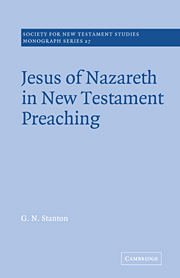Book contents
- Frontmatter
- Contents
- Preface
- Abbreviations
- Introduction
- 1 Jesus of Nazareth in missionary preaching: Luke's view
- 2 Luke's presentation of Jesus in his Gospel
- 3 Pre-Lucan traditions about Jesus in the speeches in Acts
- 4 Jesus in Paul's preaching
- 5 The gospels and ancient biographical writing
- 6 Jesus in the gospel traditions
- 7 The gospel traditions in the early church
- Conclusions
- Index of passages cited
- Index of authors
- General Index
5 - The gospels and ancient biographical writing
Published online by Cambridge University Press: 04 October 2009
- Frontmatter
- Contents
- Preface
- Abbreviations
- Introduction
- 1 Jesus of Nazareth in missionary preaching: Luke's view
- 2 Luke's presentation of Jesus in his Gospel
- 3 Pre-Lucan traditions about Jesus in the speeches in Acts
- 4 Jesus in Paul's preaching
- 5 The gospels and ancient biographical writing
- 6 Jesus in the gospel traditions
- 7 The gospel traditions in the early church
- Conclusions
- Index of passages cited
- Index of authors
- General Index
Summary
The Christian church has always treasured the gospels as records of the life and character of Jesus. But many New Testament scholars insist that the gospels (or at least the traditions which lie behind them) are not concerned to portray the character of Jesus of Nazareth.
R. Bultmann uses his understanding of the perspective of the gospels to support his insistence that the kerygma is not concerned with more than the mere Doss of the existence of Jesus. He concedes that the gospels do tell us some things about Jesus of Nazareth, but this is, as it were, incidental or even contrary to their primary intention.
The gospels, it is often claimed, intend to proclaim the Risen Christ and are not primarily concerned with the past of Jesus; this misunderstanding arises when they are read from a modern perspective, with its preoccupation with history and biography. The main contention of this chapter is that, on the contrary, failure to read the gospels sufficiently carefully against the background of biographical writing in the ancient world has led to confused interpretations of their nature and intention.
If one wishes to suggest that either the gospels or the gospel traditions were concerned with the past of Jesus, the tenaciously held objection that the gospels are not biographies must be met. The very word ‘biography’ has become to a form critic like a red rag to a bull. Almost all the standard books on the gospels state that the gospels are not biographies.
- Type
- Chapter
- Information
- Jesus of Nazareth in New Testament Preaching , pp. 117 - 136Publisher: Cambridge University PressPrint publication year: 1975



